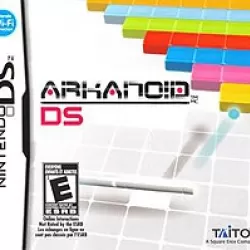Arkanoid: Revenge of Doh
Details: Arcade game
Descr: Arkanoid - Revenge of Doh is an arcade game released by Taito in 1987 as a sequel to Arkanoid. Wikipedia
Initial Release Date: 1987
Series: Arkanoid
Modes: Up to 2 players, alternating turns
Composer: Hisayoshi Ogura
Platforms: Nintendo Entertainment System, Arcade game, DOS, MORE
Developers: Ocean Software, Taito
Descr: Arkanoid - Revenge of Doh is an arcade game released by Taito in 1987 as a sequel to Arkanoid. Wikipedia
Initial Release Date: 1987
Series: Arkanoid
Modes: Up to 2 players, alternating turns
Composer: Hisayoshi Ogura
Platforms: Nintendo Entertainment System, Arcade game, DOS, MORE
Developers: Ocean Software, Taito















